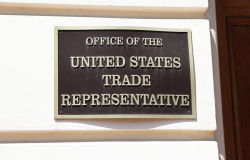Creating the Enabling Environment for Effective Fisheries Enforcement
Marking the fifth in ECSP's series on fisheries management, this event explores the ways in which poor enforcement and governance enable overfishing, the importance of good policy for fisheries management, and different approaches to effective and sustained enforcement.
Overview
"Global fishing is a system out of balance," said Tom Grasso, director of the World Wildlife Fund's International Fisheries Conservation Program at an event sponsored by the Environmental Change and Security Program on April 10, 2007. Correcting the imbalance, he said, requires taking a "systems" approach to fisheries—a holistic framework that addresses the various drivers of overfishing, as well as the current inadequacies in enforcement and governance. Marking the fifth in ECSP's series on fisheries management, this event explored the ways in which poor enforcement and governance enable overfishing, the importance of good policy for fisheries management, and different approaches to effective and sustained enforcement.
The Cycle of Overfishing
Overexploitation of fisheries is part of a larger destructive cycle that greatly impacts small-scale fishers, as well as ecosystems. "Over the last six or seven years, the international community has recognized that there is a linkage between overfishing and poverty," Grasso said. For many developing countries, fish contribute greatly to the national economy. This resource dependence, coupled with rising demand, drives a destructive cycle: Unsustainable fishing leads to habitat destruction and declining stocks, which in turn leads to lower incomes and increasing poverty. Meanwhile, demand either continues to rise or remains the same, since fewer fish are on the market. "We must figure out how to change this system," he said.
 Fisheries management and enforcement are critical to breaking the overfishing cycle. Yet many developing countries lack the resources and capacity to safeguard their coastal resources and national waters. West Africa, for example, loses roughly $1 billion annually in economic rent from fisheries. According to Kieran Kelleher, a senior fisheries specialist at the World Bank, the heart of the problem is a breakdown in the rule of law. Citing a recent article that found a direct correlation between a country's diplomatic parking tickets and its World Bank governance score, he noted that poor fisheries management can be traced to a basic disrespect for the legal system: "When we talk about fishing, we have to talk about rights: You have the right to fish but an obligation not to abuse those rights."
Fisheries management and enforcement are critical to breaking the overfishing cycle. Yet many developing countries lack the resources and capacity to safeguard their coastal resources and national waters. West Africa, for example, loses roughly $1 billion annually in economic rent from fisheries. According to Kieran Kelleher, a senior fisheries specialist at the World Bank, the heart of the problem is a breakdown in the rule of law. Citing a recent article that found a direct correlation between a country's diplomatic parking tickets and its World Bank governance score, he noted that poor fisheries management can be traced to a basic disrespect for the legal system: "When we talk about fishing, we have to talk about rights: You have the right to fish but an obligation not to abuse those rights."
Importance of Policy
Consistent policies are especially important to fisheries management, said Kelleher: "They have to be coherent in content and application, and they need to be articulated properly." Norway, for example, prohibits catching certain fish species, while neighboring Denmark forbids fishing vessels from taking some species on board. One fisherman was caught between the two systems: Norwegian officials deemed 40 percent of his catch illegal, but would not allow him to dump the fish in their waters. When he traveled to Danish waters to unload the fish, the Danish ministry admonished him for possessing illegal fish and instructed him to sail back to Norway. "You can see the incoherence between these kinds of policies," said Kelleher. "These are two different countries, but in many cases they have shared fisheries. This type of policy incoherence has to be resolved."
IUU Fishing and Enforcement
Illegal, unregulated, and unreported (IUU) fishing—valued at $9 billion annually—is one of the main obstacles to more sustainable fishing practices, claimed Kelleher: "It undermines rule of law and the profits of good fishers." For example, fish catch from the coast of West Africa is estimated to be worth US$2.5 billion, yet only 25 percent of this value is captured by West African economies. Aerial surveillance photos reveal that roughly 15 percent of the fishing vessels in the area are illegal or fishing without a license. This is common practice, he noted, but since the system is so convoluted, identifying the violator is often impossible: "Vessels are flagged in one place and owned in another, insured in a third, chartered somewhere else, the profits go to another country, and the captain is from another country again."
Kelleher believes IUU fishing is analogous to organized crime: "Often this is not petty theft, it is highly profitable.... There are organized ‘laundries' to move fish from one place to another." Additionally, the level of IUU fishing and the World Bank's governance indicators are closely correlated, he said: "Corruption and overfishing are really linked." Legitimate income is stripped away from artisanal fishers, preventing them from turning natural capital into financial capital that can then be reinvested in infrastructure, education, or health care. "[This kind of] corruption is a key block on the system in many developing countries," he said.
While IUU fishing is a severe problem, it hinges on the larger problem of enforcement. One poorly enforced problem is the encroachment of industrial vessels on artisanal fisheries. Information systems are not synched well enough for countries to identify when foreign vessels are carrying greater fishing loads than they report. Kelleher claimed that larger vessels regularly report lower tonnage than they actually carry, but it is difficult to catch this illegal activity due to the lack of shared information. To any observer, however, the calculations do not make sense: "The [reported] effort is completely out of line with reality."
Exporting Ideas, Importing Fish
In 1976, the original Magnuson-Stevens Fishery Conservation and Management Act established the 200-mile nautical limit off U.S. coastlines as exclusive U.S. fishing territory. By extension, the act legitimized the 200-mile limit off the coasts of other fishing nations, resulting in the now agreed-upon Exclusive Economic Zones. In early 2007, President Bush signed into law the Magnuson-Stevens Reauthorization Act. Rebecca Lent, director of international affairs at NOAA, noted that the reauthorized act—which may result in a "flurry of regulatory activity in coming years"—has an active international component. "We are supposed to produce a report by 2009, identifying the countries that engage in IUU fishing. We are then supposed to work with them, and if those measures don't work, then we are supposed to impose trade sanctions," she said.
While she noted the importance of tackling IUU fishing, Lent also emphasized the complicity of U.S. consumers: "I always liken this to the drug trade: If we are using all these illegal drugs, then we are certainly part of the problem." Currently, the United States exports roughly $1 billion worth of seafood, but imports nearly $9 billion. "We have a responsibility, as consumers, to know what is going on out there," she said.
Lessons Learned
Taking a holistic approach to fisheries management and enforcement is crucial, the speakers agreed. "Everything is linked," said Lent. "But the big challenge is coordinating all the work that is going on." According to Grasso, "The U.S. government can't do it alone. The NGO community can't do it alone. The private sector can't do it alone either. I think collaboration on certification schemes is really important."
Grasso also called for a sense of perspective: "There are different cultural, political, and social contexts that we need to translate in a way that informs [other countries] and improves their fisheries." For example, the U.S. Coast Guard has an annual budget nearing $8 billion, part of which can be spent on enforcement. But Mozambique—the coastline of which rivals the length of the U.S. eastern seaboard—has only three patrol vessels. "We have to think in different ways," he stressed. "We are not going to move an entire navy over there. And if they build boats, they are most likely going to build fishing boats. So we need to be creative when we look at these problems."
Small-scale interventions also require a shift in thinking. Rather than segmenting the needs of a particular community into sectors—biodiversity, economics, health, etc.—Grasso suggested engaging the entire community: "We need to really understand what it takes to make a healthy community. And this is a challenge because we are used to going in and telling them what they need. We need to sit down and come up with a plan that is part of a collaborative discussion."
Lessons can also be learned from other sectors. One audience member noted the many similarities between the forestry and fisheries sectors: "We can highlight how all these issues are very similar to the tropical forests, and raise the awareness of the complicated issues around fisheries." Grasso, while noting that "fish folk tend to stick with fish folk," agreed: "We can learn a lot from our colleagues in the agriculture sector and in the forestry sector."
Drafted by Alison Williams.
Speakers
Hosted By

Environmental Change and Security Program
The Environmental Change and Security Program (ECSP) explores the connections between environmental change, health, and population dynamics and their links to conflict, human insecurity, and foreign policy. Read more
Thank you for your interest in this event. Please send any feedback or questions to our Events staff.










